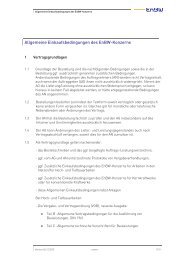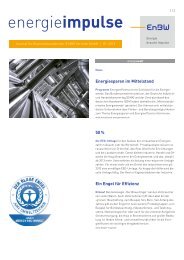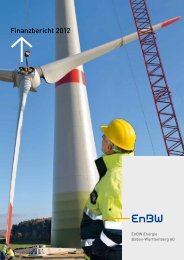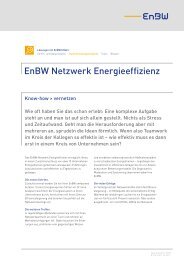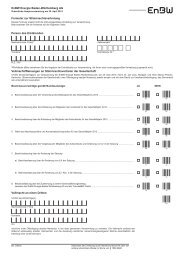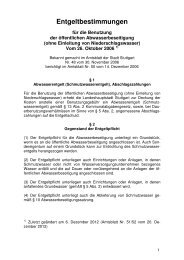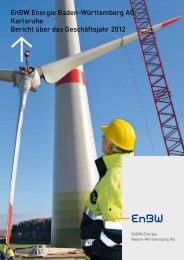2008 I 2009 Sustainability Report - Econsense
2008 I 2009 Sustainability Report - Econsense
2008 I 2009 Sustainability Report - Econsense
You also want an ePaper? Increase the reach of your titles
YUMPU automatically turns print PDFs into web optimized ePapers that Google loves.
Pulling in the same direction –<br />
employer and employees<br />
Employee headcount<br />
At the end of <strong>2008</strong>, the EnBW Group employed<br />
20,501 people, which means the<br />
number of employees was almost the same<br />
as in the previous year (20,265). More than<br />
one in two employees worked in the Electricity<br />
business area, while Energy and Environmental<br />
Services accounted for just over<br />
35% and Gas for around 5% of EnBW employees.<br />
95.8% of our employees were working<br />
on unlimited employment contracts as<br />
of the end of <strong>2008</strong>. 69.8% of our employees<br />
were based on Baden-Württemberg, 26.1%<br />
in other German states and 4.1% worked<br />
abroad.<br />
Personnel structure<br />
The percentage of women in the overall workforce<br />
was 24.8%, compared to 24.1% for the<br />
previous year. Year on year, the share of parttime<br />
employees – which also includes our<br />
employees in the partial retirement phase –<br />
rose slightly by 0.9% to 10.8%, equivalent to<br />
2,208 employees. Women accounted for 1,321<br />
(59.8%) of all part-time employees. In <strong>2008</strong>,<br />
the share of women in management positions<br />
within the EnBW Group showed a modest increase<br />
from 6.9% to 7.2%.<br />
40<br />
At the end of the year under review, the<br />
EnBW Group had 986 handicapped and severely<br />
handicapped employees (previous<br />
year: 944), 4.8% of the total headcount. As of<br />
December 31, <strong>2008</strong>, the percentage of non-<br />
German employees in the Group was at<br />
6.6 %. On data protection grounds, no data<br />
are collected on minorities at EnBW.<br />
The average age of the EnBW workforce was<br />
only slightly higher than the 2007 figure<br />
(43.1) at 43.4. The average duration of company<br />
service showed a modest increase<br />
from 16.1 to 16.7 years. The breakdown of<br />
employees by age was more or less unchanged<br />
compared to 2007. The fluctuation<br />
rate stood at 5.4% and includes all departures<br />
including retirement – but without<br />
internal moves and moves between companies.<br />
21.4% of the employees in the EnBW Group<br />
hold academic degrees (previous year:<br />
20.2%). The number of employees who have<br />
technical college diplomas or who have<br />
completed an apprenticeship is almost unchanged<br />
at 72.8% (after 72.7%), while 5.8%<br />
possess school leaving diplomas but have<br />
no vocational qualifications (compared to<br />
7.1% in the previous year).<br />
<strong>2008</strong> Booklet, p. 23<br />
Apprenticeships with real prospects<br />
The apprenticeship training rate in the<br />
EnBW core companies in Baden-Württemberg<br />
is traditionally extremely high and<br />
stood at 7.9% at the end of <strong>2008</strong>; as in past<br />
years, we once again provided 334 apprenticeship<br />
places in <strong>2009</strong>.<br />
School-leavers from all types of school can<br />
apply for a suitable apprenticeship place<br />
with EnBW at 14 locations in Baden-Württemberg.<br />
The spectrum of training occupations<br />
ranges from industrial commercial<br />
assistant and business assistant for office<br />
communication all the way to electrical<br />
engineer and industrial mechanic. We also<br />
give young people the option of combining<br />
career start and degree studies. The 13 study<br />
courses offered by EnBW lead to a Bachelor's<br />
degree awarded by a traditional university<br />
or a cooperative state university.<br />
For twelve years now, our apprentices and<br />
students have had the chance to voluntarily<br />
take part in the "Social Learning" project<br />
during their training. Every year, around<br />
180 apprentices take this opportunity to<br />
help out in hostels and work projects for the<br />
handicapped, in childcare nurseries, child or<br />
youth assistance centres and care homes for<br />
the elderly. The project is organised in cooperation<br />
with the "mehrwert" agency, who<br />
arrange placements for young people in social<br />
projects in Stuttgart and Karlsruhe. In<br />
addition, EnBW has been working together<br />
successfully with the "Arbeiterwohlfahrt"<br />
German workers' welfare organisation in<br />
Karlsruhe and Tuttlingen for the last five<br />
years. The project comprises three phases:<br />
the introductory and "raising awareness"<br />
phase is followed by an internship lasting<br />
one to two weeks which is turn followed by<br />
an evaluation and presentation phase.<br />
EnBW hopes that this part of the training<br />
phase will promote a social understanding<br />
as well as social skills and responsible attitudes.




